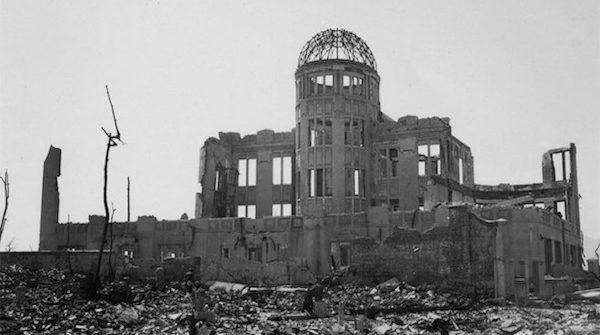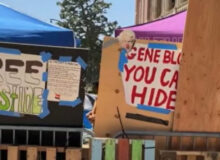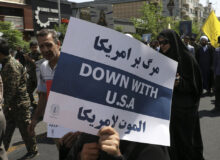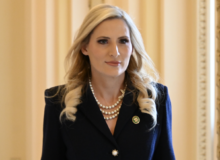Seventy-eight years ago today, the world changed. With the dropping of one bomb on Hiroshima, Japan, mankind had finally found a weapon that could wipe out the entire population, literally at once.
The United States had been working on developing an atomic weapon after having been warned by Albert Einstein that Nazi Germany was already researching nuclear weapons. Germany had been defeated by the time the United States conducted the first successful test (July 1945). But the war against Japan wasn’t over.
President Harry S. Truman was warned by his advisers that any attempt to invade Japan would result in a horrific number of deaths–up to a million. So he ordered that the new weapon be used to bring the war to a speedy end.
On August 6, 1945, the American bomber Enola Gay dropped a five-ton bomb over the Japanese city of Hiroshima. A blast equivalent to the power of 15,000 tons of TNT reduced five square miles of the city to ruins and immediately killed 80,000 people. Tens of thousands more died during the following weeks from wounds and radiation poisoning.

After the bomb was dropped, President Truman released a statement:
The British, Chinese, and United States Governments have given the Japanese people adequate warning of what is in store for them. We have laid down the general terms on which they can surrender. Our warning went unheeded; our terms were rejected. Since then the Japanese have seen what our atomic bomb can do. They can foresee what it will do in the future.
The world will note that the first atomic bomb was dropped on Hiroshima, a military base. That was because we wished in this first attack to avoid, insofar as possible, the killing of civilians. But that attack is only a warning of things to come. If Japan does not surrender, bombs will have to be dropped on her war industries and, unfortunately, thousands of civilian lives will be lost. I urge Japanese civilians to leave industrial cities immediately, and save themselves from destruction.
I realize the tragic significance of the atomic bomb.
Its production and its use were not lightly undertaken by this Government. But we knew that our enemies were on the search for it. We know now how close they were to finding it. And we knew the disaster which would come to this Nation, and to all peace-loving nations, to all civilization, if they had found it first.
That is why we felt compelled to undertake the long and uncertain and costly labor of discovery and production.
We won the race of discovery against the Germans.
Having found the bomb we have used it. We have used it against those who attacked us without warning at Pearl Harbor, against those who have starved and beaten and executed American prisoners of war, against those who have abandoned all pretense of obeying international laws of warfare. We have used it in order to shorten the agony of war, in order to save the lives of thousands and thousands of young Americans.
We shall continue to use it until we completely destroy Japan’s power to make war. Only a Japanese surrender will stop us.
Looking for that surrender, on August 9, three days later, another bomb was dropped on Nagasaki, killing nearly 40,000 more people.

Not wanting to miss out on grabbing a piece of Japan, Russia declared war on Japan the same day the atomic bomb was dropped on Nagasaki.
There has been much revisionist history about dropping the atomic bombs on Hiroshima and Nagasaki. Some say that Japan was poised to surrender before these horrible weapons were dropped and that Truman did not have to use the Atomic Bomb. If this was the case, no one told Truman or informed the Japanese Emperor.

At noon on August 15, 1945, the Emperor of Japan announced Japan’s surrender over the radio. BeThis was the first time in history the people of Japan had ever heard their Emperor’s voice before he made the announcement. In time, it will be said to Jacob and Israel, ‘What has God wrought?’ members of the Japanese military came close to refusing Emperor Hirohito’s surrender order. In fact, Major Kenji Hatanaka tried to rally a coup de etat but failed.
He blamed the surrender on the horrible new weapon.
The enemy, moreover, has begun to employ a new most cruel bomb, the power which to do damage is indeed incalculable, taking toll of many innocent lives. Should we continue to fight, it would only result in the ultimate collapse and obliteration of the Japanese nation . . . but would lead also to the total extinction of human civilization. Such being the case, how are we to save millions of our subjects, or ourselves, to atone before the hallowed spirits of our Imperial ancestors? This is the reason we have ordered the acceptance of the provisions of the joint declaration of the Powers.
Soon after the U.S. developed the atomic bomb, other nations developed nuclear weapons also. In 1949 the world was horrified as Soviet Russia tested an atomic weapon. The world settled into what eventually became known as mutually assured destruction (MAT). No nation wanted to use nuclear weapons because any first strike could be answered with an equally destructive response. But now there are many more nuclear nations.
Over the past seven decades, additional countries have gone nuclear. Not all of them are rational. Along with the U.S. is Russia, United Kingdom, France, China, India, Pakistan, North Korea, and Israel (although officially, Israel will not say whether or not they have nuclear weapons). Beyond those, we know that Iran is on the precipice of a weapon.
The preference for nuclear weapons is frightening, and every day it’s a miracle that one country doesn’t snap and start a nuclear war. I am reminded of a line from the book of Bamidar (Numbers), which may be an omen; In time, it will be said to Jacob and Israel, ‘What has God wrought?’
The use of the atomic bomb to end WWII was as horrible as it was necessary. Two bombs killed over two hundred thousand people, wounding countless others (and that doesn’t even include the birth defects), but it was still much less than a land invasion would have caused.
By seeing the destruction, the repugnant human devastation of this weapon, mankind may have worked even hard never to use it again. Thankfully in the seventy-eight years since no country has dared to use these horrific weapons whose killing power has been refined and expanded. But there is no doubt about it President Truman made the right decision.






